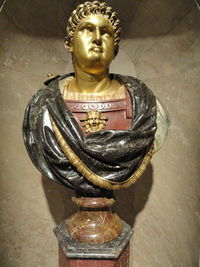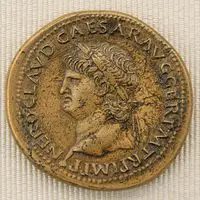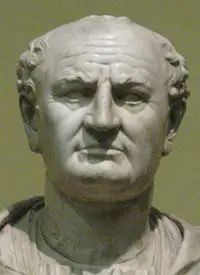Difference between revisions of "What was the impact of the Emperor Nero on the Roman Empire"
| Line 32: | Line 32: | ||
===Nero’s policies in the East=== | ===Nero’s policies in the East=== | ||
[[File:Vespasianus02 pushkin.jpg|200px|thumb|left|Bust of the Emperor Vespasian]] | [[File:Vespasianus02 pushkin.jpg|200px|thumb|left|Bust of the Emperor Vespasian]] | ||
| − | Nero was a far more active Emperor than many gave him credit for at the time and since. He was particularly interested in the East. Still, his record -was mixed. Nero attempted to permanently annex the Bosphoran Kingdom in the Crimea but his successors reversed this and were content to have it as a client kingdom. Nero fought a war with Parthia. He appointed a commoner to lead the Roman armies and he managed to inflict several defeats on the Parthians.<ref> Suetonius. Life of Nero. 43</ref> Nero was able to turn the strategic kingdom of Armenia into a client kingdom and this allowed him to secure the borders with Parthia. He also obliged the Parthians to hand over some legion ‘eagles’ or standards that had been captured. Nero’ s success against the Parthians meant that the Eastern frontier was at peace for several decades<ref> Tacitus. The Annals of Imperial Rome, 56</ref> | + | Nero was a far more active Emperor than many gave him credit for at the time and since. He was particularly interested in the East. Still, his record -was mixed. Nero attempted to permanently annex the Bosphoran Kingdom in the Crimea but his successors reversed this and were content to have it as a client kingdom. Nero fought a war with Parthia. He appointed a commoner to lead the Roman armies and he managed to inflict several defeats on the Parthians.<ref> Suetonius. Life of Nero. 43</ref> Nero was able to turn the strategic kingdom of Armenia into a client kingdom and this allowed him to secure the borders with Parthia. He also obliged the Parthians to hand over some legion ‘eagles’ or standards that had been captured. Nero’ s success against the Parthians meant that the Eastern frontier was at peace for several decades.<ref> Tacitus. The Annals of Imperial Rome, 56</ref> |
However, during his reign the administration of Judea was poor and contributed to the great Jewish Revolt (66-71 AD). The Jewish historian stated that the Jews believed him to be a ‘tyrant.’<ref> Josephus. <i>History of the Jewish War</i>, ii</ref> Perhaps his most lasting legacy was his generally pro-Greek policies in the Eastern half of the Empire. He granted ‘liberties’ to many Greek cities in the eastern portion of his empire. This led them to become economically successful and culturally vibrant. <ref> Holland, p. 324</ref> This partly explains why unlike the west that the east did not succumb to Romanization but remained very much influenced by Hellenic culture. Later emperors such as Hadrian imitated Nero’s policies towards the Greek cities. | However, during his reign the administration of Judea was poor and contributed to the great Jewish Revolt (66-71 AD). The Jewish historian stated that the Jews believed him to be a ‘tyrant.’<ref> Josephus. <i>History of the Jewish War</i>, ii</ref> Perhaps his most lasting legacy was his generally pro-Greek policies in the Eastern half of the Empire. He granted ‘liberties’ to many Greek cities in the eastern portion of his empire. This led them to become economically successful and culturally vibrant. <ref> Holland, p. 324</ref> This partly explains why unlike the west that the east did not succumb to Romanization but remained very much influenced by Hellenic culture. Later emperors such as Hadrian imitated Nero’s policies towards the Greek cities. | ||
Revision as of 01:47, 15 February 2018
Roman history was noted for having very many ‘bad’ emperors. One of the most notorious of these is Nero. He was the last of the Julian-Claudian dynasty and became infamous for his artistic pretensions, hedonism, and his great cruelty. There are many myths about Nero and this often obscured the reality of his reign. The emperor was a very important figure in the history of Rome. He was the last of his dynasty and his death ushered in a period of instability. His death led to a period of civil war the first in almost one hundred years. Nero was the first to persecute Christians and he set a precedent for that religion's persecution that was to last on and off for almost three centuries.
Background
Augustus had brought peace to the Roman Empire and during his reign he amassed a range of powers. He made himself in effect the first Emperor.[1] Romans feared instability after his death and they accepted his step-son, Tiberius, as his successor.[2] This established the hereditary principle for Imperial succession and the Julian-Claudians became the de-facto royal house of the Empire. Tiberius, who is often portrayed as a depraved and bloody old man, was in fact a very capable leader. He reformed the system of governance and tax-collection and his rule was mild. By the time of his death the hereditary principle was established and his nephew Gaius (Caligula) became Emperor.[3] Caligula four years in power were bizarre and bloody and after his assassination he was succeeded by Claudius. Often portrayed as something of a fool, but he did at times show that he was a capable leader. He ordered the conquest of Britain and also annexed much of modern-day Morocco for his empire.[4]
In the first-century AD the Empire was at its zenith. There had been peace for several decades and the borders were relatively secure. The majority of provincials were loyal to the Empire and they were increasingly Romanized. The economy of the Empire was generally good. There was also a great cultural flourishing and poets such as Ovid and writers such as Petronius, produced masterpieces of Latin literature that are still read to this day. This was the Empire that Nero inherited.[5]
The life and reign of Nero
It is important to note that there are no surviving contemporary records of Nero and that many of the surviving accounts are possibly biased. Nero was born in 37 AD. His parents were Gnaeus Domitius Ahenobarbus, a member of one of the most powerful Roman families and Agrippina the Younger, sister of Emperor Caligula. He was a grant-nephew of Augustus and therefore a member of the Julian-Claudian family. Nero was not viewed as a future emperor at the time of his birth.[6] During the reign of his uncle Caligula, his mother fell from favour and his family were persecuted. His father died (of natural causes) and his mother was exiled. Nero’s fortunes changed with the assassination of his uncle Caligula. Claudius became Emperor and after a disastrous marriage, he married Agrippina the Younger, his niece.[7] She was able to persuade Claudius to make her son Nero his heir and he married the daughter of Claudius from his first marriage. It is widely believed that Agrippina, probably with the help of Nero poisoned Claudius. Nero became Emperor in 54 AD at the age of seventeen.[8] His mother, was a domineering woman and it is believed that she manipulated her young son to advance her own interests.
The first five years of Nero’s reign were seen as generally positive. The government was in the hands of two experienced ministers one of whom was the writer Seneca the Younger and the Burrus.[9] Agrippina the Younger vied for control of the empire with Seneca and his colleague but they remained in control. In 55 B.C it seems that Nero wanted to control the Empire and he had Seneca and Burrus dismissed. Later he killed his mother as he grew tired of her constant efforts to dominate him and control the Empire.[10] Nero’s changed after he murdered his and according to the ancient sources he morphed into grotesque tyrant.
Nero murdered any senator who opposed him. His personal life was bizarre and he married one of his male slaves. Nero was passionate about the games and he personally participated in the Olympic games in Greece.[11] The Emperor also considered himself to be first and foremost an artist. He at first performed his work in private but then publicly performed his work in Greece. Nero also acted on the stage. This scandalized the Roman elite who considered actors to be little better than prostitutes. The sight of Nero acting was appalling to them.
Nero was also paranoid about plots and he killed anyone he suspected of being a threat. While Nero was very unpopular with the elites, he was popular with the poor. He reformed the judicial and taxation system and made it fairer. Nero also built gymnasiums and baths in Rome that were open to ordinary Romans. The population of Rome and elsewhere in the Empire revered the Emperor and saw him as their protector. According to Suetonius, the emperor was ‘carried away by a craze for popularity and he was jealous of all who in any way stirred the feeling of the mob.’ [12] The philosopher Epictetus argued that Nero was an insecure, immature and unhappy man and needed acclaim.[13]
Nero was also a lavish builder and some sources say that he left the treasury bankrupt while others argued that his spending was part of an economic policy to revive a stagnant economy. In 66 AD, a great fire destroyed much of Rome.[14] The cause of the fire is not known. It may have been accidental or arson. Elites blamed Nero for the fire and he was accused of clearing Rome for his building projects.
By 68 AD, Nero had begun to raise taxes and there were many reports of growing discontent among the elite. While in the east there was a major Jewish Revolt and the Romans had been expelled from much of Judea. In 68 AD Vindex in Gaul revolted but was later put down, by the Roman legions.[15] Finally, the Roman army grew weary of Nero even though he was a member of the House of Julius Caesar and Augustus.[16] In Spain, Galba and the Spanish legions revolted. This revolted was welcomed by the elites in Rome.[17] Galba set sail for Rome and Nero attempted to rally his forces. However, he had alienated the elite and he was quickly abandoned. Nero was forced to flee with some of slaves but later committed suicide. He ordered on of his slaves to cut his throat.[18] Nero remained popular with the poor and after his death Rome became incredibly unstable because three separate pretenders who claimed to be the Roman Emperor.
The Year of the Four Emperors and the end of the Julian-Claudian dynasty
Nero’s reign and his death destabilized the Empire. His low tax policy combined with his lavish spending had led to an economic recession. He had also alienated the elites in Rome and elsewhere. He had also failed to provide strong government as is evident in the revolt of Vindex in Gaul and the Jewish Revolt. In the aftermath of his death, unlike that of his unstable uncle Caligula, there was no living male who was a member of the Julian-Claudian line.[19] The Julian-Claudian family had killed many of their relatives and after the death of Nero, who had no sons, there was no legitimate claimant to the throne. This left the army as the power broker and in the year after Nero's deaths, legions fought each other for control of the Empire.[20] The year 69 AD is often known as the year of the ‘Four Emperors’. In that year four men, Galba, Otho, Vitellius and Vespasian declared themselves emperor. Vespasian emerged as the victor and established the Flavian dynasty. [21]
Nero ended the Julian-Claudian dynasty. His death left a power vacuum which destabilized the Empire and led to competing generals to fight a series of civil wars. Nero’s reign forced the re-emergence of the Roman army into state politics for the first time in a century. The year 69 AD was important as it showed that the army could both make and unmake an emperor.[22]
Nero and the Christians
Nero was the first Roman Emperor to actively persecute the small sect of Christians. They had grown greatly since the crucifixion of Jesus. They had established themselves in Rome and attracted many adherents. They were not popular with other groups and their beliefs were treated with suspicion. They were after all self-confessed followers of Jesus who had been lawfully executed by the Roman governor of Judea.[23] In 69 AD, a great fire swept through Rome and caused general unrest in the city. Nero accused Christians of starting the fire to shift blame away from himself. [24] According to Tacitus, he was very eager to quell rumours that he was responsible for the fire ‘ consequently, to get rid of the report, Nero fastened the guilt and inflicted the most exquisite tortures on a class hated for their abominations, called "Christians" by the populace.’[25] Nero established a precedent whereby an Emperor could declare the Christians to be public enemies. Nero’s and later persecutions were to shape the nature of Christianity but it did not stop its spread. The many martyrs created by the persecutions only strengthened the faith and it eventually became the state religion of the Empire in the later 4th century AD.
Nero’s policies in the East
Nero was a far more active Emperor than many gave him credit for at the time and since. He was particularly interested in the East. Still, his record -was mixed. Nero attempted to permanently annex the Bosphoran Kingdom in the Crimea but his successors reversed this and were content to have it as a client kingdom. Nero fought a war with Parthia. He appointed a commoner to lead the Roman armies and he managed to inflict several defeats on the Parthians.[26] Nero was able to turn the strategic kingdom of Armenia into a client kingdom and this allowed him to secure the borders with Parthia. He also obliged the Parthians to hand over some legion ‘eagles’ or standards that had been captured. Nero’ s success against the Parthians meant that the Eastern frontier was at peace for several decades.[27]
However, during his reign the administration of Judea was poor and contributed to the great Jewish Revolt (66-71 AD). The Jewish historian stated that the Jews believed him to be a ‘tyrant.’[28] Perhaps his most lasting legacy was his generally pro-Greek policies in the Eastern half of the Empire. He granted ‘liberties’ to many Greek cities in the eastern portion of his empire. This led them to become economically successful and culturally vibrant. [29] This partly explains why unlike the west that the east did not succumb to Romanization but remained very much influenced by Hellenic culture. Later emperors such as Hadrian imitated Nero’s policies towards the Greek cities.
Conclusion
Nero is regarded as either a mad or outright evil Emperor. He was undoubtedly cruel and committed many crimes. However, he was also an important figure in the history of Rome. Nero was the first Emperor to persecute Christians and many other Emperors were to follow his example. He also had some successes in the east especially against the Parthians and he did much to promote Hellenic culture in the eastern provinces. He was the last of the Julian-Claudian dynasty and his death led to a series of bloody civil wars. This period of instability led to the army determining who should be emperor. This was one of the most important legacies of Nero the re-emergence of the legions as a political force, something that Augustus and his heirs had prevented for several decades.
Related DailyHistory.org Articles
- What was Plato's academy and why did it influence Western thought?
- Alexander the Great Top Ten Booklist
- Why was Alexander the Great So Successful In His Conquests?
- How did the Etruscans shape Roman history and society?
- What was the impact of Augustus' victory over Mark Anthony and Cleopatra on Rome?
References
- ↑ Tacitus. Annals of Rome. 1
- ↑ Suetonius. Life of Tiberius. 4
- ↑ Suetonius, Life of Caligula. 8
- ↑ Suetonius, Life of Claudius, 8
- ↑ Griffin, Miriam T. Nero: The End of a Dynasty ( London: Yale University Press, 1985), p 12
- ↑ Suetonius, Life of Nero. 5
- ↑ Tacitus. Annals of Rome. 34
- ↑ Suetonius. Life of Claudius. 62
- ↑ Tacitus, The Annals of Imperial Rome, 45
- ↑ Griffin, p 123
- ↑ Suetonius, Life of Nero. 34
- ↑ Suetonius. Life of Nero. 53
- ↑ Arrian. Sayings of Epictetus. 56
- ↑ Tacitus, Annals of Imperial Rome, 56
- ↑ Tacitus. The Histories. 45
- ↑ Holland, Richard. Nero (The Man Behind the Myth. Stroud: Sutton Publishing, 2000), p 145
- ↑ Suetonius. Life of Galba, 7
- ↑ Suetonius, Life of Nero, 54
- ↑ Holland, Tom. Dynasty. The rise and fall of the house of Caesar (London, Little Brown, 2015), p. 347
- ↑ Holland, p. 349
- ↑ Holland, p. 406
- ↑ Holland, p. 412
- ↑ Tacitus. Annals of Imperial Rome.Holland, 67
- ↑ Holland, p. 334
- ↑ Tacitus. The Annals of Imperial Rome.Holland, 15, 44
- ↑ Suetonius. Life of Nero. 43
- ↑ Tacitus. The Annals of Imperial Rome, 56
- ↑ Josephus. History of the Jewish War, ii
- ↑ Holland, p. 324
Admin, Ewhelan and EricLambrecht


